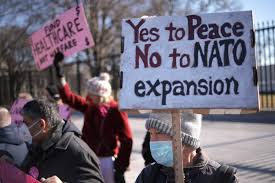On the Ukrainian Crisis: Demand an Immediate Ceasefire and Negotiated Settlement! Canadian Peace Congress

All Global Research articles can be read in 51 languages by activating the “Translate Website” drop down menu on the top banner of our home page (Desktop version).
To receive Global Research’s Daily Newsletter (selected articles), click here.
Visit and follow us on Instagram at @globalresearch_crg and Twitter at @crglobalization.
Today, the dangers of military escalation are beyond description.
What is now happening in Ukraine has serious geopolitical implications. It could lead us into a World War III scenario.
It is important that a peace process be initiated with a view to preventing escalation.
Global Research condemns Russia’s invasion of Ukraine.
A Bilateral Peace Agreement is required.
The conflict in Ukraine has now entered its second week, with no end in sight. Casualties continue to rise and the flow of refugees through Poland, southern Russia and other countries grows daily. Hostilities must be brought to a quick end, and military confrontation replaced by diplomatic negotiations to stop the war before it spins out of control.
Preliminary negotiations between Russian and Ukrainian authorities have begun, but so far only reached agreement to open ‘humanitarian corridors’ for civilians fleeing some of the conflict zones.
While this is welcome, the main weakness in this limited negotiation process is that the U.S., one of the key ‘players’ in this conflict, is not at the table, and has repeatedly shown no interest in achieving a settlement on the big issues which have given rise to this crisis.
To achieve any meaningful progress, the world’s peace forces must demand that the two main protagonists, Russia and the U.S., enter into immediate, serious, and comprehensive negotiations (without pre-conditions) to achieve an immediate ceasefire, the de-escalation of tensions, and a lasting solution guaranteeing the sovereignty and national security of all states on the European continent.
In our view, this agreement needs to encompass the following:
(1) the withdrawal of all foreign troops and military personnel – Russian, NATO and foreign mercenaries – from Ukraine;
(2) guarantees of the national security interests of all countries, including an immediate halt to the Eastern expansion of NATO, and its rollback to pre-1997 levels, creating a ‘buffer zone’ of neutral states between NATO and the Russian Federation;
(3) the removal of all sanctions and other unilateral coercive measures against all states;
(4) adoption and implementation of the UN Treaty on the Prohibition of Nuclear Weapons (TPNW); and
(5) restoration of the language and cultural rights of the Russian-speaking and other national minorities within Ukraine (subject to international monitoring).
While this kind of settlement may well seem implausible and unrealizable, we are convinced that only such a comprehensive agreement can help end the current conflict and create a lasting basis for peace and cooperation among all the peoples on the European continent. The alternative – a return to Cold War hostilities, economic warfare and nuclear brinksmanship – is too frightening to contemplate.
For its part, the Trudeau government, which has sadly played a leading role in stoking this crisis and fueling the flames of war, must abandon this dangerous course, and instead embrace and champion such a path to peace. Canada can show real, independent leadership by rejecting its slavish kowtowing to Washington’s every demand, and by removing all CAF personnel from, and ending all arms shipments to Ukraine, and by withdrawing from the NATO military alliance.
*
Note to readers: Please click the share buttons above or below. Follow us on Instagram, @globalresearch_crg and Twitter at @crglobalization. Forward this article to your email lists. Crosspost on your blog site, internet forums, etc.
Featured image is from CODEPINK

